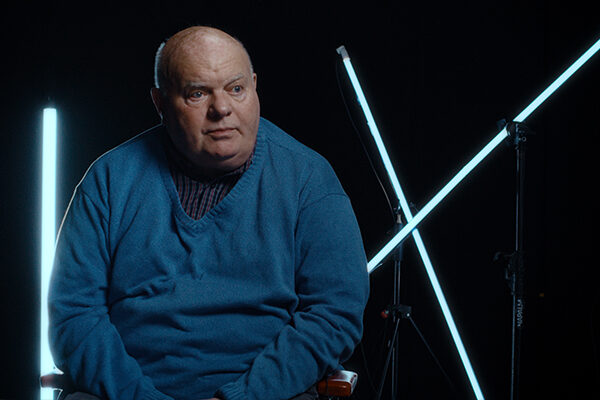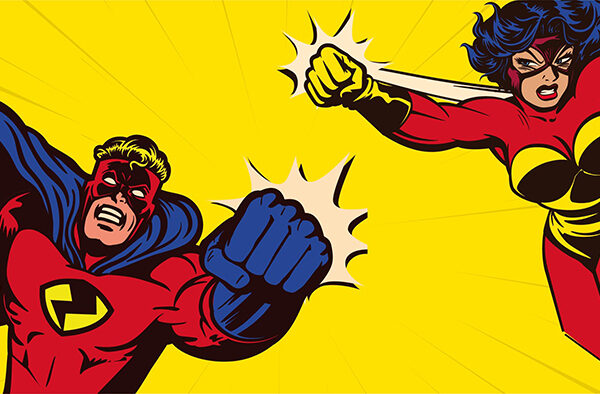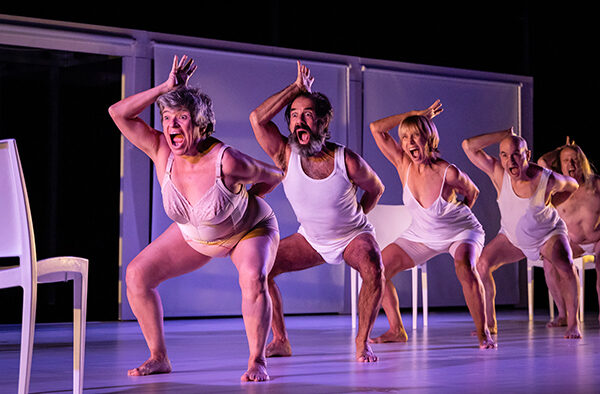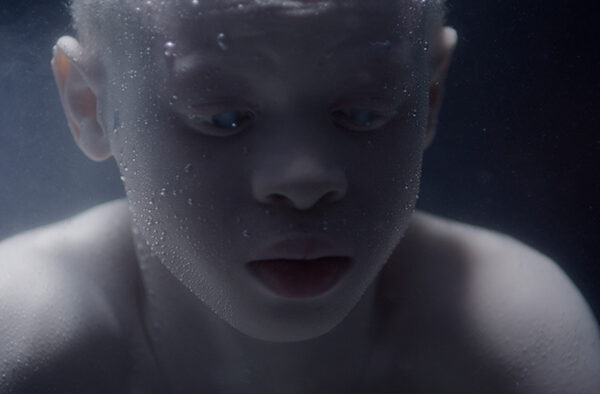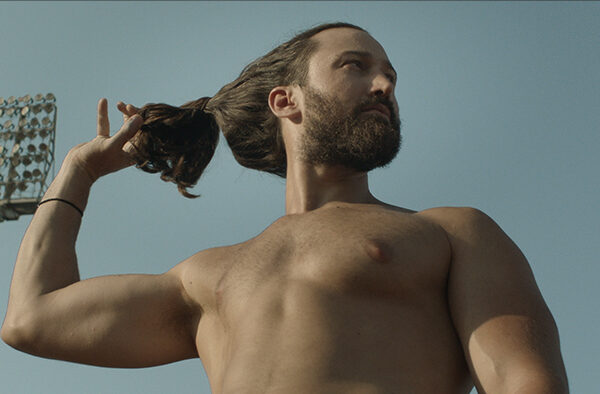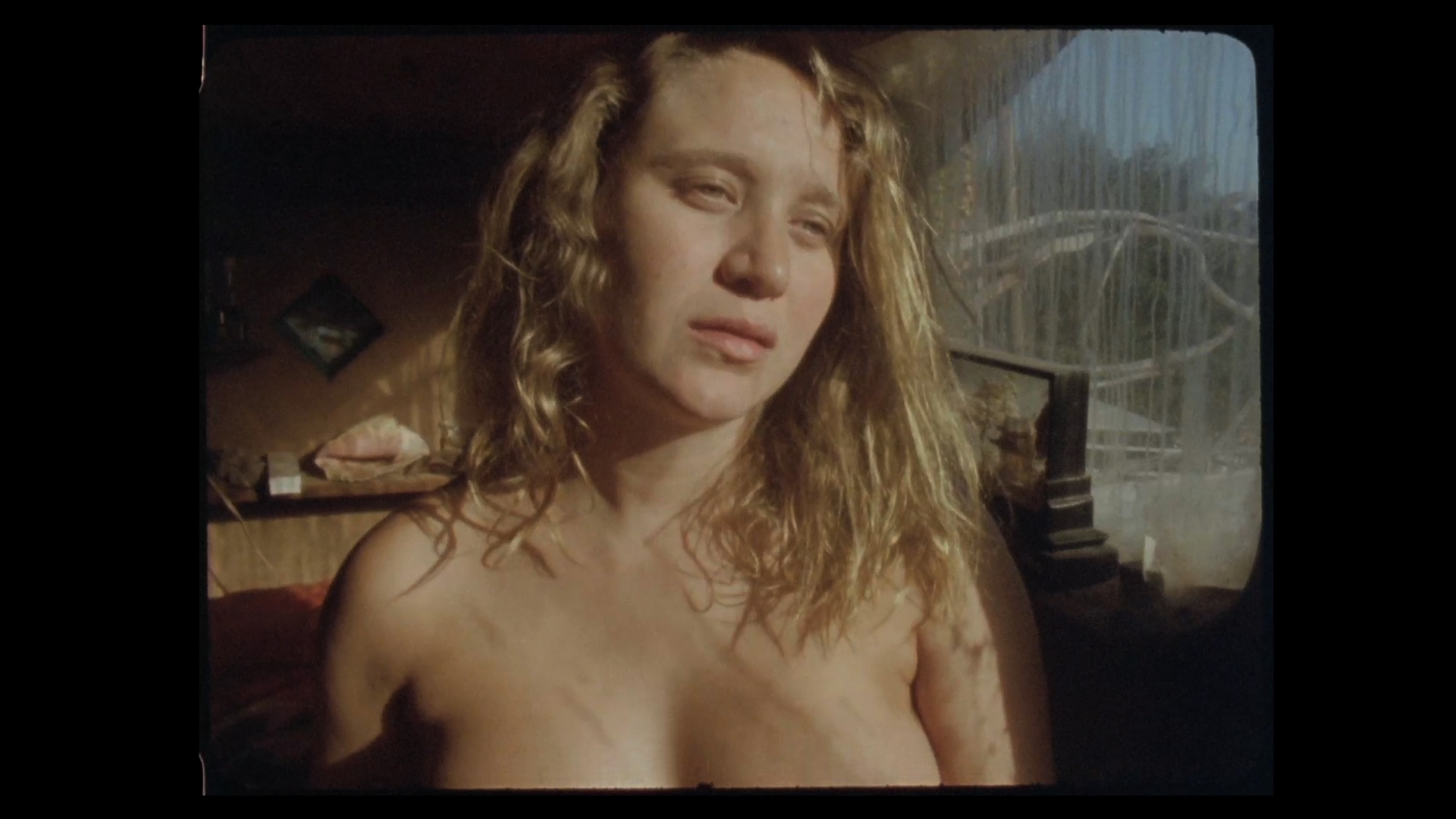
The latent voice
(first movement)
An actress, Raquel Ferri, gives birth. And an actress, Raquel Ferri, plays the night and day during which she gave birth.
Dreams can also be a matter of life or death. In this dream, the actress multiplies into different women, and prepares to give birth. And in some moment (from the past or the future) he relives the desires, the fears, the hopes, the friction of the bodies in transformation.
At the decisive moment of childbirth, real life and acting embrace and look into each other's eyes, just as it always does in our lives.
Access by professionals
With a deliberately dreamy tone, The latent voice explores the desires, fears and hopes of a woman at such a decisive moment in her life as childbirth.
Artistic team
Direction and assembly
Isaki Lacuesta
Performers
Raquel Ferri, Silvia Perez Cruz, Albert Ubach Font, Martí Ferri Ubach and Luna Lacuesta
photography
Adriana Villa Guevara
Camera Assistant
Pau Mira
Executive production
Isa Field
Changing room
Lorena Panea
laboratory
Cinelabs
Cinelabs coordination
Cornelia Pope
Kodak film
Alejandro Paino
Team Sílvia Pérez Cruz
Alex Sanchez and Albert Smiles
Music
The Womb (Silvia Perez Cruz / Sylvia Plath)
The latent voice
(first movement)
An actress, Raquel Ferri, gives birth. And an actress, Raquel Ferri, plays the night and day during which she gave birth.
Dreams can also be a matter of life or death. In this dream, the actress multiplies into different women, and prepares to give birth. And in some moment (from the past or the future) he relives the desires, the fears, the hopes, the friction of the bodies in transformation.
At the decisive moment of childbirth, real life and acting embrace and look into each other's eyes, just as it always does in our lives.
Access by professionals
Related Videos
The Cave Vol. 3 Declan Donnellan
La Caverna is an audiovisual project where a series of artists who have been through Temporada Alta and linked to the festival reflect on their career, the performing arts and the world of creation, together with other artists, journalists and international personalities from the world of the culture
XII Dramaturgy Tournament (2nd Battle)
17/10/22
XAVI BUXEDA - BERTA PRIETO
The most anticipated match of Temporada Alta. Eight playwrights face the audience's verdict with the only weapon of the word. Each week two texts and four actors without technical requirements. Yaiza Berrocal, Víctor Borràs, Xavi Buxeda, David Mataró, Berta Prieto, Lola Rosales, Carla Rovira and Sergio Serrano are the participants of the twelfth edition of the Dramaturgy Tournament.
After four bouts, two semi-finals and a grand final, only one author remains who is declared the absolute winner. Let the show begin, authors in the ring!
#4 Death, old age and suicide
Have you ever wondered what your death will be like? Have you ever thought if the last years of your life? Will you spend your old age in a retirement home? Have you ever contemplated suicide? In a single chapter we will talk about topics that we constantly avoid. Three taboos Let's start with one of the few certainties we have, death. What equalizes everyone never appears in conversations and a good excuse can be provided, precisely, by plays such as "Those who do not die" by Las Huecas or "Sleeping City" by Pau Masaló and Irene Visa. But, before reaching the end of life, we also do not talk about the previous stage of most mortals, old age. We look away from it so much that it even gives rise to discrimination such as ageism. "Moriu-vos", the new "Culture and conflict" project, invites us to reflect on it. Finally, another taboo that we break is that of suicide. There are more and more people who consider that hiding it under silence does it no good, but that it is by talking about it and well, that we can prevent it. Two recent shows face him, "Harakiri" by Les Impuxibles and "Lacrimosa" by Bárbara Mestanza and Francesc Cuéllar. Will you join us for this walk that starts in a cemetery?
XII Playwriting Tournament (Semifinal 1)
14/11/22
DAVID MATARÓ - CARLA ROVIRA
The most anticipated match of Temporada Alta. Eight playwrights face the audience's verdict with the only weapon of the word. Each week two texts and four actors without technical requirements. Yaiza Berrocal, Víctor Borràs, Xavi Buxeda, David Mataró, Berta Prieto, Lola Rosales, Carla Rovira and Sergio Serrano are the participants of the twelfth edition of the Dramaturgy Tournament.
After four bouts, two semi-finals and a grand final, only one author remains who is declared the absolute winner. Let the show begin, authors in the ring!
A Spanish Odyssey
Progress is what has made us so different after a few thousand years and has transformed the world so much. Other species are practically the same now as they were thousands of years ago. An example of this is the scorpion, which is also one of the few animals capable of killing itself (or so they say).
The other animal that can do this is, without a doubt, man.
In the desert, the monkey becomes human because he can quench his thirst with the salvific drop that the bottle still contains, or is it precisely because he is already beginning to be (human) that he goes to the bottle, knowing that it does not contain only liquid that will calm him but the essence of what will be permanence and reflection, ie pain?
XII Dramaturgy Tournament
(Final)
12/12/22
CARLA ROVIRA - XAVI BUXEDA
The most anticipated match of Temporada Alta. Eight playwrights face the audience's verdict with the only weapon of the word. Each week two texts and four actors without technical requirements. Yaiza Berrocal, Víctor Borràs, Xavi Buxeda, David Mataró, Berta Prieto, Lola Rosales, Carla Rovira and Sergio Serrano are the participants of the twelfth edition of the Dramaturgy Tournament.
After four bouts, two semi-finals and a grand final, only one author remains who is declared the absolute winner. Let the show begin, authors in the ring!
XII Dramaturgy Tournament (4th Battle)
07/11/22
VÍCTOR BORRÀS - YAIZA BERROCAL
The most anticipated match of Temporada Alta. Eight playwrights face the audience's verdict with the only weapon of the word. Each week two texts and four actors without technical requirements. Yaiza Berrocal, Víctor Borràs, Xavi Buxeda, David Mataró, Berta Prieto, Lola Rosales, Carla Rovira and Sergio Serrano are the participants of the twelfth edition of the Dramaturgy Tournament.
After four bouts, two semi-finals and a grand final, only one author remains who is declared the absolute winner. Let the show begin, authors in the ring!
Spot Temporada Alta 2009
A theater festival is like a melon: you have to open it to know how it is.
As a fruit, the melon has many virtues (against depression, for example) and is used in different cures. Apart from being a fruit, however, it has several symbolisms that can give rise to many, sometimes suggestive, interpretations.
Purgatory
Purgatory is a free interpretation of Purgatory. vrather than being like a mythological story about redemption. A cry in favor of the purge. A necessary purge to start over again, having learned from mistakes and pointing out culture as a powerful elevator capable of making the human soul soar.
Tragedy, the song of the goat
Why is everything falling apart? We have forgotten where we came from and do not know where we are going. Everything dies and to be born again you have to be willing to die. If we are lost, why don't we look back? Our tragedy is already 4000 years old. Lyrical tribute to ancient Greece, essential cradle of what we are, and its tragedy today, which is also ours. Love song to the humanistic origin of our culture, the basis of Western rational thought. Tragedy is the origin of everything.

